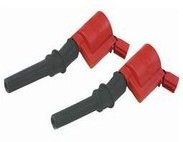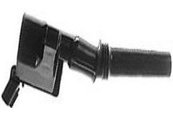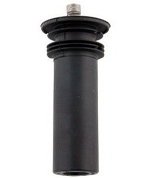Coil On Plug Ignition Problems

The coil on plug ignition system has been out for quite a while and seems to be gaining in popularity. Although the system does seem to be extremely reliable I have ran into a few problems with individual coils. Note that I have some replacement and high-performance ignition parts available below the article.
The problems I have seen included an intermittent rough engine idle that would set a check engine light code for random misfire. I have also seen a few completely dead coils that set misfire codes for specific cylinders. If you set a P0303 code this would indicate a malfunction needs to be diagnosed on the number three cylinder.
In my worst-case scenario I had an extremely intermittent engine miss on a Ford van that would only misfire when the engine was extremely hot. It set a code for a random misfire which did not help me narrow down which cylinder had the problem. This was a V10 gas engine and the cost of replacing 10 coils just to find the bad one would have been huge.
I tried purchasing one new coil and then rotating it through each individual cylinder to see if the problem was solved. Unfortunately the engine misfire could take up to an hour to resurface so my method of switching out the coils with a known good one was time-consuming.

Before I started switching out the coils with the known good one I did take the time to use an ohmmeter on each individual coil to test resistance. Each one tested within specifications even though there was a problem with one of them when Hot.
I finally discovered which coil was causing the intermittent misfire by searching through Ford technical service bulletins. Although it did not tell me which cylinder was going to have the problem it did indicate that a hairline crack could develop on the bottom side of the coil and cause this condition?
I removed all of the coils and inspected the back sides of them with a magnifying glass. A tiny hairline crack was observed on the cylinder closest to the driver. I took my one good coil and put it in that cylinder and I have not heard from the driver since. As you can see finding out which coil has the problem can sometimes be challenging.
What is Coil Over Plug Ignition

The operation of a coil on plug ignition system is basically the same as that of any other. The main difference is that these systems have an individual coil for each spark-plug. The two most modern designs of this kind of spark system would be the coil on plug (COP) and the separate coil per cylinder.
The main difference between these two types of systems is revealed in their description. The separate coil per cylinder system will have a short spark plug wire running to the plug. The coil itself will usually be mounted just above the plug or nearby at least. The coil on plug system has a boot that directly connects the coil to the plug.
They say that the main advantage of these new systems is that having one coil for each spark plug allows for more time between each firing. This can increase the life of each individual coil as it is allowed to cool between firings. This off time is also used to increase the output of the spark by charging the coil while it waits for the orders to fire.
The (COP) ignition system is controlled by the PCM or power train control module. The crankshaft or camshaft position Sensor provides the input to the PCM. The power train control module is programed with the firing order for the engine and determines which ignition coil should be fired at the right time.
It would seem that the advantages of these new ignition systems outweigh the troubles that you may encounter when trying to hunt down one single bad component in the system. I have seen many engines with these types of systems go to the junkyard with no problems at all. This may not provide any comfort to you if you are having a random misfire and are having problems locating the bad coils.
In my opinion purchasing a subscription to an online auto repair manual helped me find the problem that I discussed above. I know a lot of people search on the Internet for free information, but sometimes it is worthwhile to pay a few bucks to save a couple of days of labor. I wrote an article on this blog about free auto repair manuals. Looking for more of the latest posts? This next link will take you back to the auto repair blogs home page.

